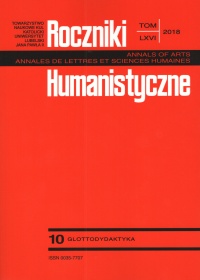The Affect vs. Effect – Open Forms of Learning from the Glottodidactic Perspective
Abstract
The article presents open forms of learning and teaching, such as free work, working at the stations, working according to the day/week plan and the project work from the glottodidactic perspective. On the one hand the affective factor is analysed, which is the factor responsible for motivating the students through appropriate choice of content and materials. On the other hand, the discussion is focused on the analysis of the cognitive aspect, which means the analysis of the effects of education in the view of contemporary communicative – cross-curicular teaching. These perspectives will be complemented by the analysis of social-active aspect, thus, the possibility for cooperation while learning in connection with the dydactic idea of learning by doing, as well as the material-dynamic aspect, which corresponds to the organisation of work in the glottodidactic atelier. The theoretical discussion has been connected with the presentation of the effects of the author’s own empirical study in this area.
References
Brown R., 2006, Procesy grupowe. Dynamika wewnątrzgrupowa i międzygrupowa, Gdańsk.
Council of Europe: Coste D., North B., Sheils J., Trim J., 2003, Europejski System Opisu Kształcenia Językowego: uczenie się, nauczanie, ocenianie, Warszawa.
Doyé P., 1995, Lehr- und Lernziele, w: Handbuch Fremdsprachenunterricht, red. K.-R. Bausch, Tübingen–Basel, s. 161-166.
Eckhardt T., Einstellung als individuelle Lernvariable, www.uni-due.de/imperia/md/content/prodaz/eckhardt_einstellung.pdf [dostęp: 24.11.2015].
Edmondson W., House J., 1993, Einführung in die Sprachlehrforschung, Tübingen–Basel.
Grotjahn R., 1995, Empirische Forschungsmethoden: Überblick, w: Handbuch Fremdsprachenunterricht, red. K.R. Bausch i in., Tübingen–Basel, s. 457-461.
Holec H., 1981, Autonomy in Foreign Language Learning, Oxford.
Karpeta-Peć B., 2008, Otwarty, aktywny, samodzielny… Alternatywne formy pracy. Przewodnik dla nauczycieli języków obcych, Warszawa.
Karpeta-Peć B., 2016, Innowacyjne rozwiązania glottodydaktyczne w kształceniu kompetencji międzykulturowej, w: Rozwijanie kompetencji międzykulturowej w różnych kontekstach glottodydaktycznych, „Neofilolog” XLVI, nr 2, s. 185- 198.
Łobocki M., 2000, Metody i techniki badań pedagogicznych, Kraków.
Macke G., Hanke U., Viehmann P., 2008, Hochschuldidaktik. Lehren, vortragen, prüfen, Weinheim–Basel.
Niemierko B., 2002, Ocenianie szkolne bez tajemnic, Warszawa.
Paradies L., Linser H. J., 2008, Differenzieren im Unterricht, Berlin.
Peschel F., 2010, Offener Unterricht. Idee, Realität, Perspektive und ein praxiserprobtes Konzept in der Evaluation, Baltmannsweiler.
Riemer C., Settinieri J., 2010, Empirische Forschungsmethoden in der Zweit- und Fremdsprachenerwerbsforschung, w: Deutsch als Fremd- und Zweitsprache. Ein internationales Handbuch, red. H.-J. Krumm i in., Berlin–New York, s. 764-781, http://moodle2.unifr.ch/pluginfile.php/218612/mod_resource/content/1/G-23_Riemer-Settinieri_2010.pdf [dostęp: 03.04.2015].
Rupprecht R., 2008, Über die Hand zum Verstand – Lernen in der Lernwerkstatt, w: Über die Hand zum Verstand. Handreichung für den Aufbau einer Lernwerkstatt. red. Bayerisches Staatsministerium für Unterricht und Kultus, München, s. 12-26, http://www.verwaltung.bayern.de/egov-portlets/xview/Anlage/3562322/UeberdieHandzumVerstand [dostęp: 06.11.2013].
Vester F., 1975, Denken, Lernen, Vergessen, Stuttgart.
Wilczyńska W., 2004, Dydaktyka krocząca, czyli jak organizować dydaktykę w półautonomii (PA), w: Autonomia w nauce języka obcego, red. M. Pawlak, Poznań–Kalisz, s. 44-56.
Wilczyńska W., Michońska-Stadnik A., 2010, Metodologia badań w glottodydaktyce. Wprowadzenie, Kraków 2010.
Copyright (c) 2018 Roczniki Humanistyczne

This work is licensed under a Creative Commons Attribution-NonCommercial-NoDerivatives 4.0 International License.





